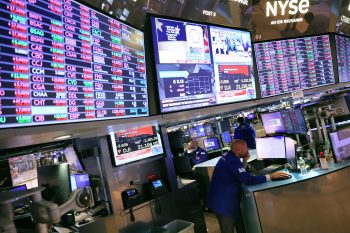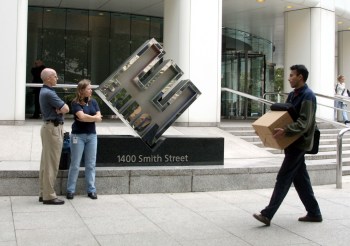‘Sheepish bulls’ are coming back to Wall Street
TEXT OF INTERVIEW
Tess Vigeland: Two years ago, this weekend, investors were in full-on panic mode. On Friday, March 6, 2009, the Dow closed just above 6,600. Three days later, it hit what turned out to be the bottom of a long slide in the wake of the financial crisis. At the time, people yanked billions of dollars out of stocks. In other words, they sold low. Sound familiar?
Man 1: Well, when the market turned, I lost about 50 percent of my current investments.
Man 2: I was a little scared. I don’t know, I feel more confident now, but I feel I don’t have any other option.
Man 3: Yeah, I pulled some out. Some I should’ve pulled out quicker.
Man 4: I converted a lot of those stocks to cash, just afraid of… certain that I had to protect what I had.
Man 5: I moved 40 to 45 percent to bonds, ’cause I feel like you had to do something, not just leave it the same.
Man 1: I’ve increased the percentage of contribution in my 401(k). So I’m tip toe-ing back into the market you can say.
Two years later, the Dow has almost doubled — hovering around 12,000. And investors have thrown more than $30 billion at mutual funds and ETFs just since the start of the year. In other words, they’re buying high.
Well, Jason Zweig of the Wall Street Journal has a name for all those folks piling in to stocks right now and he joins us to talk about them. Welcome back.
JASON ZWEIG: Great to be with you, Tess.
VIGELAND: Now this is something I talked about last week on the show: A lot of investors seem to be getting back into the market, whole hog. And a lot of these folks are the same ones that dumped out when the Dow hit 6,500. You refer to these investors as “sheepish bulls.” Tell us what you mean by that.
ZWEIG: They’re embarrassed. A lot of — not everyone — but a lot of these investors are well aware of how their behavior seems to other people, because I think it’s how it seems to themselves. They say, “Well, I sold low, so now I’m buying high. That doesn’t sound right, but I guess I need to do it anyway.” You know, part of the problem is is the human brain will always seek to buy high and sell low, because it feels better. You want to buy something that’s going up, because it seems obvious that it’ll keep going up. And you certainly want to sell something that’s going down, because it seems to you it has nowhere to go, but further down. The problem is that buy low and sell high is a better idea, financially. It just doesn’t strike the human brain as being intuitive.
VIGELAND: What really struck me in your article, you talked to financial planners all over the country and they told you that people are actually getting more into stocks now than they did before the crash.
ZWEIG: Yeah, in some cases, that’s the behavior that people describe to me. And I puzzled over it a lot too, Tess. And there’s two forces at work here: The memories haven’t yet completely faded of how horrible 2008 and 2009 were for people. We all know that, and most of us lived through it. But the second thing that’s happening is that people have regrets. One way to think about this is that the pain of your loss is a snapshot, but your regret is a movie, because everyday — certainly until last week it seemed — everyday the market has been going up, ever since! And to sit there and watch it go up day after day, has triggered a lot of people who say to themselves, “You know, I could’ve made that money if I hadn’t gotten out.”
VIGELAND: And so they make up for it by getting even more into the stock market than they were?
ZWEIG: I think that’s some of the motivation — you know, “If only I hadn’t gotten out, I would have more money than I do today. Since I did get out, I better get back in and then some.”
VIGELAND: Then what’s kind of the course of action for people who find that they can relate to this, that they did get out when the market was tanking, and they’re buying now as the market is potentially topping. Do they just stop what they’re doing?
ZWEIG: Well, I think if you’re one of those people, there are two things you can do: The first, you should freeze. Take a good, long, hard look in the mirror and ask yourself if whether the person you are today is really better able to withstand the pain of loss than the person you were two years ago was. Obviously, two years ago, you couldn’t stand it and that’s why you get out. So what makes you think today you will be able to withstand it if it happens? That’s the first thing.
The second thing, if after you go through that exercise, you still feel determined to go forward, then please do it gradually, in small steps, over time. Cut the money into pieces and slice the time into increments, don’t just jump right back in with both feet.
VIGELAND: Jason Zweig writes the Intelligent Investor column for the Wall Street Journal and we’ve been talking to him over the years about this question of buy high, sell low and trying to do the opposite, despite your brain. Jason, thanks so much.
ZWEIG: My pleasure Tess. Thanks for having me.
There’s a lot happening in the world. Through it all, Marketplace is here for you.
You rely on Marketplace to break down the world’s events and tell you how it affects you in a fact-based, approachable way. We rely on your financial support to keep making that possible.
Your donation today powers the independent journalism that you rely on. For just $5/month, you can help sustain Marketplace so we can keep reporting on the things that matter to you.


















